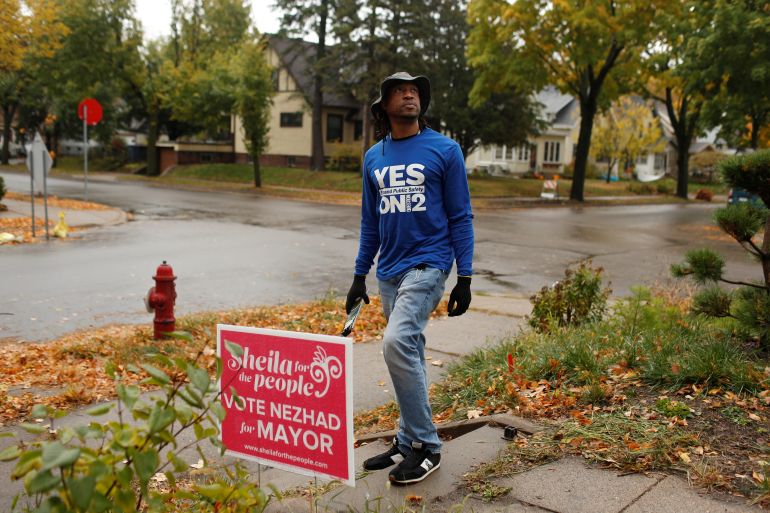In wake of George Floyd, Minneapolis votes on replacing police
Voters in the city will decide whether to scrap the existing department and create a new Department of Public Safety.

Voters in Minneapolis, Minnesota, where resident George Floyd died after a police officer knelt on his neck for more than nine minutes last year, are set to vote on whether to replace the city’s police department.
Tuesday’s extraordinary ballot question – dubbed “City Question Two” – will give voters the option to amend the city charter by removing language that mandates that Minneapolis have a police department with a minimum number of officers based on population.
Keep reading
list of 3 itemsMinneapolis reacts to Chauvin sentencing with hope, hesitation
Ex-Minneapolis cop to be resentenced after reversed conviction
Established in its place would be a new Department of Public Safety that, according to the proposed amendment, would take a “comprehensive public health approach to the delivery of functions” that “could include” police officers “if necessary, to fulfill its responsibilities for public safety”.
The ballot question capped months of social unrest following Floyd’s killing, which sparked racial justice demonstrations and often ambiguous calls across the US to “defund” the police and reroute funds to social programmes.
The debate has again brought national attention to the city as voters across the US head to the polls for local and state-level elections on Tuesday, often seen as bellwethers for social and political sentiment in the country.
Speaking to reporters on Monday, Minister JaNae Bates, a spokeswoman for the campaign in favour of eradicating the current department, said regardless of the outcome, the vote had influenced the conversation around public safety.
“No matter what happens, the city of Minneapolis is going to have to move forward and really wrestle with what we cannot unknow: that the Minneapolis Police Department has been able to operate with impunity and has done quite a bit of harm and the city has to take some serious steps to rectify that,” Bates said.
Supporters of the change, which include progressive Democratic US Representative Ilhan Omar and state Attorney General Keith Ellison, have argued that a complete overhaul of policing is necessary to stop police violence.
They have framed the vote as a chance to reimagine what public safety can be and to devote more funding towards new approaches that do not rely on sending armed officers to deal with people in crisis.
Opponent have said the ballot proposal contains no concrete plan for how the new department would operate and expressed fear that it might make communities already affected by gun violence even more vulnerable to rising crime. They have said reform should come from within the current structure.
The details of a new agency, including who would lead it, would be determined by the mayor and the City Council after the vote, leading to confusion among some residents of the city of 430,000.
‘Pawns in a political experiment’
Supporters and opponents of the overhaul have defied the usual political lines, with many high-profile Black leaders in the liberal-leaning city, including many who have led calls for greater police accountability, coming out against the change.
Those include local activist and non-profit leader Sondra Samuels, a plaintiff in an unsuccessful lawsuit that sought to remove the question from the ballot.
“We are pawns in a political experiment that has no plan,” she told the Star Tribune newspaper in September, noting that scrapping the current police department would also mean losing the city’s first “homegrown African American” police chief in Medaria Arradondo.
Several prominent Democrats, including Minnesota Governor Tim Walz and US Senators Amy Klobuchar and Tina Smith, have also opposed the measure, fearing backlash could lead to Democratic losses across the country during midterm elections in 2022.
Some moderate Democrats have blamed the party’s lacklustre showing in the 2020 election on progressives’ emphasis on defunding the police.
The killing of Floyd and other Black Americans in 2020 prompted a patchwork of police reforms across the US, where law enforcement is typically regulated on the state and local levels.
The rare conviction of police officer Derek Chauvin for Floyd’s murder in April inflated hopes among advocates of more uniform federal reforms in policing, but legislation has since stalled in the US Congress.
Chauvin, as well as police officers Tou Thao, J Alexander Kueng and Thomas Lane, are currently awaiting trial on federal charges of violating Chauvin’s rights.
Minneapolis residents will also vote on Tuesday for a second term for Democratic Mayor Jacob Frey, who has opposed disbanding the department. Frey faced an array of opponents who attacked him for what they call weak leadership in the wake of Floyd’s death.